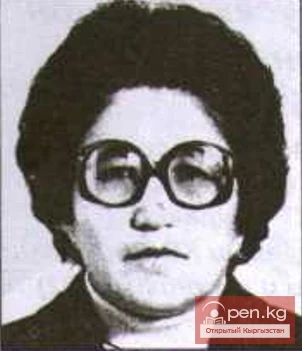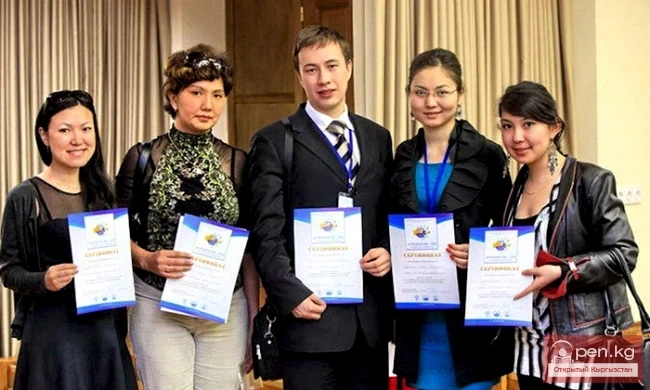Formation of New Tasks and Strategies for the Future
Licensing and accreditation of higher education institutions. For several years now, a comprehensive system for the licensing and accreditation of educational institutions in the republic has been in development. In 1994, the State Inspection for Licensing and Accreditation of Educational Institutions of the Kyrgyz Republic was established under the Ministry of Education of the Kyrgyz Republic.
At present, almost all educational institutions in the republic have undergone licensing. However, this process requires improvement, as some educational institutions clearly do not meet the existing status. For example, there are private higher education institutions in the republic with the status of academy and university that do not meet the requirements for educational institutions of such level. Today, it is necessary to conduct accreditation for those educational institutions that received innovative status during the transformations of 1992-1994. Currently, mechanisms for the accreditation of educational institutions in the republic are actively being developed.
In the context of radical democratic reforms that have encompassed all areas of life in the Kyrgyz Republic, there is a pressing need to move to the next stage of development of the higher education system, which implies various depths of reform in its components.
The transition to a personality-oriented education and a competency-based approach to the formation of educational programs is planned, with a diversity of types and kinds of educational institutions and programs that facilitate the possibility for learners to choose the level and type of education, greater orientation of education towards market demands, and integration into the global educational space.
One of the sections of the strategic program "Comprehensive Foundations for the Development of the Kyrgyz Republic (KOR)" (1999) outlines promising directions for the development of education, as well as a system of medium-term and long-term measures that collectively represent a strategy for the further development of this sector for the prospective period until 2010.
To address the tasks set, in 2002, the "Concept for the Development of Education of the Kyrgyz Republic until 2010" was adopted, which defined the further stages of development of the education system.
It is fundamentally important, while carrying out centralized actions under the auspices of the Ministry of Education, to rely on the positive experience of higher education institutions achieved within the framework of their updated principle of university autonomy and independent establishment of joint-stock companies. It is possible and necessary to stimulate the creation of such structures, but it is categorically unacceptable to force this process from "above." It must mature in the specific conditions of the country and regions. It is crucial that the inevitable demographic explosion in the next two decades is maximally utilized for such improvement of the higher education system, so that the necessary reduction in the number of independent higher education institutions does not become an end in itself.
Without a doubt, the reform of the higher education system should be seen as a fundamental step towards the unfolding of a further process that encompasses both secondary schools and preschool education. Such a sequence is important, as any attempts to reorganize secondary schools before the necessary personnel capable of implementing reform in the school system are formed would be meaningless. In particular, there are grounds to believe that the qualitative improvement of the holistic process of education and upbringing in secondary schools requires educators who undergo a complete cycle of training in higher education institutions, including a master's program, the content of which requires special consideration.
Read also:

Poet, Translator Bilim Karagulov
Poet and translator B. Karagulov was born on May 1, 1936, in the village of Chayek, Jumgal...

Critic, Literary Scholar Abdyldazhan Akmataliev
Critic and literary scholar A. Akmataliev was born on January 15, 1956, in the city of Naryn,...

Atkurova Altynai Razbaevna
Attykurova Altynai Razbaevna Art historian. Born on November 23, 1973, in the village of Gulcha,...

Ishkeyev Nazarkul
Ishkeyev Nazarkul (1955), Doctor of Pedagogical Sciences (1995), Professor (1996). Kyrgyz. Born in...

Bokoshov Jamgyrbek Bokoshovich (1954)
Zhamgyrbek Bokoshovich Bokoshov (1954), Doctor of Philosophy (1992), Professor (1993). Kyrgyz....

Critic, Literary Scholar Sanarbek Karymshakov
Critic, literary scholar S. Karymshakov was born on October 20, 1941, in the village of Kyzart,...

Tourist Area Management Program
The project "USAID Business Development Initiative" (BGI), within the tourism...

Kaligul BAI UULU
Kalygul BAI UULU (1785-1855) - a thinker, a representative of the philosophical movement of...

Karypkulov Amanbek Karypkulovich
Karypkulov Amanbek Karypkulovich (1939), Doctor of Philosophy (1983), Professor (1993),...

Poet, Critic, Literary Scholar Omor Sooronov
Poet, critic, literary scholar O. Sooronov was born in the village of Gologon in the Bazar-Kurgan...

Zhumash Mamytov
Mamytov Jumash (1935), Candidate of Philological Sciences (1967), Professor (2001) Kyrgyz. Born in...

Prose Writer, Critic Dairbek Kazakbaev
Prose writer and critic D. Kazakbaev was born on June 20, 1940, in the village of Dzhan-Talap,...

Types of Insects Listed in the 2004 IUCN RLTS Not Included in the Red Book of Kyrgyzstan
Insect species listed in the 2004 IUCN RLTS, not included in the Red Book of Kyrgyzstan 1....

BaltaBaev Mukash Rustavletovich (1921)
Baltabaev Mukash Rustavletovich (1921), Doctor of Pedagogical Sciences (1976), Professor (1977),...

Zhorobekov Zholbors
Zhorobekov Zholbors (1948), Doctor of Political Sciences (1997) Kyrgyz. Born in the village of...

Types of Insects Excluded from the Red Book of Kyrgyzstan
Insect species excluded from the Red Data Book of Kyrgyzstan Insect species excluded from the Red...

Critic, Literary Scholar Alexander Zhirkov
Critic, literary scholar A. Zhirkov was born on March 25, 1935, in the village of Ostrovskoye,...

The title translates to "Poet Soviet Urmambetov."
Poet S. Urmambetov was born on March 12, 1934, in the village of Toru-Aigyr, Issyk-Kul District,...

Prose Writer, Journalist Djapar Saatov
Prose writer, journalist Dzh. Saatov was born on February 15, 1930, in the village of Alchaluu,...

Alymov Bek (1932-1998) — Doctor of Pedagogical Sciences (1995)
Alymov Bek (1932-1998), Doctor of Pedagogical Sciences (1995), Professor (1986)...

Zarema Midinovna Kalychbekova
Kalychbekova Zarema Midinovna Graph. Born on September 25, 1950, in the village of Chayek, Jumgal...

The Poet Gulsaira Momunova
Poet G. Momunova was born in the village of Ken-Aral in the Leninpol district of the Talas region...

Prose Writer Kachkynbay (KYRGYZBAI) Osmonaliev
Prose writer K. Osmonaliev was born on March 5, 1929, in the village of Chayek, Jumgal district,...

Salamatov Zholdon
Salamatov Zholdon (1932), Doctor of Physical and Mathematical Sciences (1995), Professor (1993)...

Chorotegin (Choroev) Tynchtykbek Kadyrmambetovich
Chorotegin (Choroев) Tynchtykbek Kadyrmambetovich (1959), Doctor of Historical Sciences (1998),...

Poet, Prose Writer Medetbek Seitaliev
Poet and prose writer M. Seitaliev was born in the village of Uch-Emchek in the Talas district of...

Poet, Art Historian Sarman Asanbekov
Poet and art critic S. Asanbekov was born in the village of Aral in the Talas region of Kyrgyzstan...

Karymshakov Rakhym Karymshakovich
Karymshakov Rakhym Karymshakovich (1936), Doctor of Physical and Mathematical Sciences (1995),...

The Poet Tenti Adysheva
Poet T. Adysheva was born in 1920 and passed away on April 19, 1984, in the village of...

Poet Karymshak Tashbaev
Poet K. Tashbaev was born in the village of Shyrkyratma in the Soviet district of the Osh region...

The Poet Subayilda Abdykadyrov
Poet S. Abdykadyrova was born in the village of Sary-Bulak in the Kalinin district of the Kirghiz...

Toichubekova Burulkan
Toichubekova Burulkan (1932), Doctor of Philological Sciences (1994) Kyrgyz. Born in the village...

Types of Higher Plants Listed in the "Red Book" of Kyrgyzstan (1985)
Species of higher plants removed from the "Red Book" of Kyrgyzstan (1985) Species of...

Poet, storyteller-manaschi Urkash Mambetaliev
Poet, storyteller-manaschi U. Mambetaliev was born on March 8, 1934, in the village of Taldy-Suu,...

The Poet Kubanych Akaev
Poet K. Akaev was born on November 7, 1919—May 19, 1982, in the village of Kyzyl-Suu, Kemin...

Poet Abdilda Belekov
Poet A. Belekov was born on February 1, 1928, in the village of Korumdu, Issyk-Kul District,...

Aktanov Toychu Kuluntai Uulu (1910-1942)
Aktanov Toichu Kuluntay Uulu (1910-1942) - a representative of the first generation of Kyrgyz...

The Poet Baidilda Sarnogoev
Poet B. Sarnogoev was born on January 14, 1932, in the village of Budenovka, Talas District, Talas...

Usubaliev Beishenbai Shenkievich
Usubaliev Beishenbay Shenkievich (1954), Doctor of Philological Sciences (1994) Kyrgyz. Born in...

Poet Mariyam Bularkieva
Poet M. Bularkieva was born in the village of Kozuchak in the Talas district of the Talas region...

Critic, Literary Scholar Abdygany Erkebayev
Critic, literary scholar A. Erkebayev was born in the village of Kara-Teyit in the Alaï district...

Poet, Linguist Kasym Tynystanov
Poet and linguist K. Tynystanov was born on September 9, 1901—November 6, 1938, in the village of...

The Poet Akbar Toktakunov
Poet A. Toktakunov was born in the village of Chym-Korgon in the Kemin district of the Kyrgyz SSR...

Poet Dzholdoshbay Abdykalikov
Poet J. Abdykalikov was born in the village of Tashtak in the Issyk-Kul district of the Issyk-Kul...

Kerimzhanova Bubu Dyikanbaevna
Kerimjanova Bubu Dyikanbaevna (1920-1993), Candidate of Philological Sciences, Corresponding...

Poet Mukambetkalyy Tursunaliev (M. Buranaev)
Poet M. Tursunaliev was born on January 11, 1926, in the village of Alchaluu, Chui region of the...

General Geographic Characteristics and Development of Tourism in the Kyrgyz Republic.
The Kyrgyz Republic is located in the northeastern part of Central Asia, in the very...
